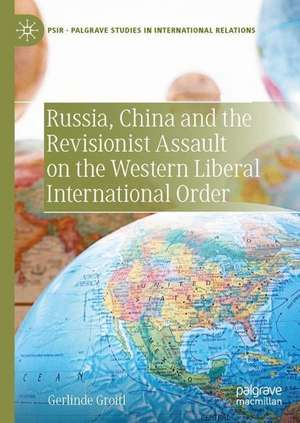Russia, China and the Revisionist Assault on the Western Liberal International Order: Palgrave Studies in International Relations
Autor Gerlinde Groitlen Limba Engleză Hardback – 23 mai 2023
Din seria Palgrave Studies in International Relations
- 8%
 Preț: 513.54 lei
Preț: 513.54 lei - 15%
 Preț: 654.77 lei
Preț: 654.77 lei - 17%
 Preț: 360.83 lei
Preț: 360.83 lei - 20%
 Preț: 692.06 lei
Preț: 692.06 lei - 20%
 Preț: 691.18 lei
Preț: 691.18 lei - 18%
 Preț: 625.59 lei
Preț: 625.59 lei -
 Preț: 388.72 lei
Preț: 388.72 lei - 15%
 Preț: 642.51 lei
Preț: 642.51 lei - 15%
 Preț: 583.28 lei
Preț: 583.28 lei - 18%
 Preț: 950.33 lei
Preț: 950.33 lei -
 Preț: 388.72 lei
Preț: 388.72 lei -
 Preț: 390.63 lei
Preț: 390.63 lei -
 Preț: 391.61 lei
Preț: 391.61 lei -
 Preț: 395.47 lei
Preț: 395.47 lei -
 Preț: 385.47 lei
Preț: 385.47 lei -
 Preț: 391.99 lei
Preț: 391.99 lei -
 Preț: 391.02 lei
Preț: 391.02 lei -
 Preț: 387.75 lei
Preț: 387.75 lei -
 Preț: 392.60 lei
Preț: 392.60 lei - 15%
 Preț: 643.34 lei
Preț: 643.34 lei -
 Preț: 387.96 lei
Preț: 387.96 lei -
 Preț: 390.63 lei
Preț: 390.63 lei -
 Preț: 388.13 lei
Preț: 388.13 lei -
 Preț: 391.61 lei
Preț: 391.61 lei -
 Preț: 383.93 lei
Preț: 383.93 lei -
 Preț: 381.00 lei
Preț: 381.00 lei -
 Preț: 391.61 lei
Preț: 391.61 lei -
 Preț: 392.60 lei
Preț: 392.60 lei -
 Preț: 386.81 lei
Preț: 386.81 lei -
 Preț: 389.70 lei
Preț: 389.70 lei -
 Preț: 392.60 lei
Preț: 392.60 lei -
 Preț: 391.61 lei
Preț: 391.61 lei -
 Preț: 388.72 lei
Preț: 388.72 lei - 15%
 Preț: 528.80 lei
Preț: 528.80 lei -
 Preț: 385.25 lei
Preț: 385.25 lei - 18%
 Preț: 781.94 lei
Preț: 781.94 lei -
 Preț: 382.36 lei
Preț: 382.36 lei -
 Preț: 383.71 lei
Preț: 383.71 lei -
 Preț: 384.86 lei
Preț: 384.86 lei -
 Preț: 390.63 lei
Preț: 390.63 lei - 15%
 Preț: 646.11 lei
Preț: 646.11 lei -
 Preț: 391.61 lei
Preț: 391.61 lei
Preț: 900.18 lei
Preț vechi: 1097.78 lei
-18% Nou
Puncte Express: 1350
Preț estimativ în valută:
172.27€ • 179.63$ • 143.17£
172.27€ • 179.63$ • 143.17£
Carte tipărită la comandă
Livrare economică 21 martie-04 aprilie
Preluare comenzi: 021 569.72.76
Specificații
ISBN-13: 9783031186585
ISBN-10: 3031186583
Pagini: 458
Ilustrații: IX, 458 p. 11 illus.
Dimensiuni: 148 x 210 mm
Greutate: 0.71 kg
Ediția:2023
Editura: Springer International Publishing
Colecția Palgrave Macmillan
Seria Palgrave Studies in International Relations
Locul publicării:Cham, Switzerland
ISBN-10: 3031186583
Pagini: 458
Ilustrații: IX, 458 p. 11 illus.
Dimensiuni: 148 x 210 mm
Greutate: 0.71 kg
Ediția:2023
Editura: Springer International Publishing
Colecția Palgrave Macmillan
Seria Palgrave Studies in International Relations
Locul publicării:Cham, Switzerland
Cuprins
Part I: Introduction.- Chapter 1: Enduring Rivals: The Return of Great Power Politics between Russia, China and the West.- Part II: Theory of International Order Building and Revisionism.- Chapter 2: Falling Short: International Order and Revisionism in IR Theory.- Chapter 3: Strategic Choices: Neoclassical Realist Model of Order and Revisionism.- Part III: Western Triumph & Non-western Accommodation in the 1990s.- Chapter 4: False History: Globalization of the US-led Liberal West and its Delusions.- Chapter 5: Russia’s Fall: Resentful Accommodation to Grim Post-Cold War Realities.- Chapter 6: China’s Rise: Strategic Accommodation to Post-Cold War Opportunities.- Part IV: Western Crisis & Anti-western Revisionism From the Late 2000s.- Chapter 7: Return of History: Outgrowth amidst Erosion of the US-led Liberal Order.- Chapter 8: Russia’s Nightmare: Destructive Revisionism for Great Power Survival.- Chapter 9: China’s Dream: Constructive Revisionism for “Great Rejuvenation”.- Part V: Conclusion.- Chapter 10: Geopolitical Realities: The Case for Neo-Containment against Russia and China.
Notă biografică
Gerlinde Groitl is Associate Professor of International Politics and Transatlantic Relations at the University of Regensburg, Germany.
Textul de pe ultima copertă
This book analyzes Russian and Chinese revisionism in the face of US and Western post-Cold War liberal international order building and asks why both powers have turned revisionist in the late 2000s. The study develops a neoclassical realist model of international order building and contestation and posits to view revisionism as a strategic choice. States go revisionist if the status quo international order threatens their vital security needs (broadly defined not only as territorial security, but also political, economic, normative and ontological) and if they have the means to challenge the undesirable status quo. Russia and China were both unhappy with the post-Cold War international order of American designs, but had to opt for accommodation in the 1990s and early 2000s (“strategic accommodation” in the Chinese case, “resentful accommodation” in the Russian case), before revisionism became even more of a necessity and a real policy option from the late 2000s onward (“constructive revisionism” in the Chinese case, “destructive revisionism” in the Russian case). The author calls for a policy of neo-containment to counter Moscow’s and Beijing’s efforts to game and erode the international order.
Gerlinde Groitl is Associate Professor of International Politics and Transatlantic Relations at the University of Regensburg, Germany.
Caracteristici
Analyzes Russian and Chinese revisionism in the face of US and Western post-Cold War Asks why both powers have turned revisionist in the late 2000s Develops a neoclassical realist model of international order building and contestation
